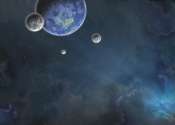Planetologists investigate origin of heavy bombardment of the moon 3.9 billion years ago
The moon was exposed to a heavy bombardment of asteroids 3.9 billion years ago. The origin of this bombardment, however, was previously unclear. Planetologists at Münster University have now tested these hypotheses with ...









